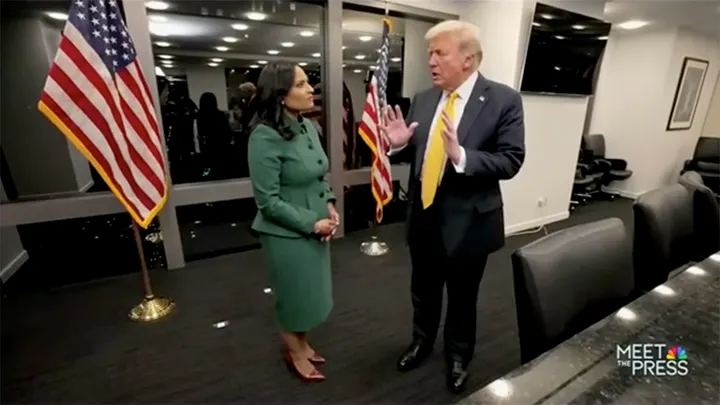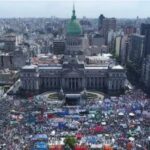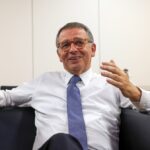
Trump promises mass deportation effort, impose tariffs and pardon many convicted of the January 6 attack in an interview with “Meet the Press” moderator Kristen Welker.
President-elect Donald Trump has promised to implement immediate and drastic changes as soon as he takes office on January 20, such as pardons for those convicted of the attack on the US Capitol. He also stated that he wants to find a legislative solution to keep the “Dreamers” legally in the country.
In an interview with Kristen Welker, moderator of NBC News’ “Meet the Press,” Trump also stated that he will work to extend the tax cuts approved in his first term. He said he will not seek to impose restrictions on abortion pills. Furthermore, it plans to deport millions of undocumented immigrants and attempt to end the right to birthright citizenship. Trump has said pardons for those involved in the Jan. 6 riots will come on the first day of his term, arguing that many suffered excessively harsh treatment in prison.
“These people are living in hell,” he said.
🇺🇸 On December 8, 2024, the president-elect of the United States, Donald Trump, gave an exclusive interview to journalist Kristen Welker on NBC News’ Meet the Press program.
Below, the video subtitled exclusively by Cafezinho. pic.twitter.com/TovTdC92lY
— O Cafezinho ☕️🗞 (@ocafezinho) December 11, 2024
Trump intends to end birthright citizenship and says citizens with illegal relatives can be deported
Trump’s first television interview after the election took place on Friday at Trump Tower in Manhattan, where he spoke for more than an hour about the policy plans Americans can expect in his next term.
Trump said he would fulfill a campaign promise to impose tariffs on imports from the United States’ biggest trading partners. In one notable moment, he admitted uncertainty when Welker asked if he could “guarantee that American families will not pay more” as a result of his plan.
“I can’t guarantee anything,” Trump said. “I can’t guarantee tomorrow.”
Trump also said he will not raise the minimum age for government programs like Social Security and Medicare, nor make cuts to them as part of spending reduction efforts led by Elon Musk and Vivek Ramaswamy. When asked if “raising the age or something like that” was “out of the question,” Trump agreed, saying, “I won’t do that.”
Minimum wage, immigration and Obamacare
The interview covered a variety of topics — during which Trump continued to maintain some distance between himself and the conservative “Project 2025,” which was designed to be a policy guide for his administration. Although he previously distanced himself from the policy manual, he has come to support it more closely and agreed that some of the drafters are now part of his transition team.
“A lot of these things I agree with,” Trump said.
He said he would consider increasing the federal minimum wage, which has been at $7.25 per hour since 2009, but would like to consult with the nation’s governors. “I agree it’s a very low number,” he said.
Trump also said he will release his full medical records. He will be 82 when his term ends in 2029 — the same age as President Joe Biden currently is. He said he has no plans to divest from Truth Social, the billion-dollar platform he launched after leaving office. “I don’t know what to undo,” he said. “All I do is post messages.” Additionally, he said he will not seek to replace Federal Reserve Chairman Jerome Powell, whom he has criticized in the past.
Trump has said his children will not serve as White House advisers, a change from last term when his daughter Ivanka Trump and son-in-law Jared Kushner served as senior advisers with offices in the West Wing. “I’ll miss them,” he said. He did not respond to a question about what role his wife, Melania Trump, will play in the new term, although he described the future first lady as “very elegant” and “very popular.”
Immigration
Immigration was the center of Trump’s campaign, and he did not hesitate to say that he will carry out the mass deportation of people living illegally in the country.
The first targets will be convicted criminals, he said. When pressed whether the targets would go beyond that group, Trump added: “Well, I think you have to do that, and it’s a difficult thing — it’s very difficult to do. But you have to have, you know, rules, regulations, laws. They came illegally.”
It is possible that American citizens will be affected by the operation, being deported along with family members who are in the country illegally or choosing to leave with them.
When asked about families with mixed immigration status, where some are in the U.S. legally and others illegally, Trump said, “I don’t want to separate families, so the only way to not separate the family is to keep them together and you’re going to have to send them away.” everyone back.”
The cost and logistical complexities of deporting millions of people have not deterred him, he said.
“You have no choice,” Trump said. “First of all, they are costing us a fortune. But we’re starting with the criminals, and we have to. Then we’ll start with the others and see how it goes.”
An exception might be “Dreamers” — people who were brought to the U.S. illegally as children and have lived here for years. Trump has demonstrated openness to a legislative solution that would allow them to remain in the country.
“I’m going to work with the Democrats on a plan,” he said, praising the “Dreamers” who have gotten good jobs, started businesses and become successful residents. “We’re going to have to do something with them,” he said.
Trump also said he intends to eliminate the right to birthright citizenship, the protection enshrined in the 14th Amendment that guarantees citizenship to anyone born on American soil, regardless of parents. Asked about the likelihood that doing so unilaterally would face legal opposition, Trump said he would consider amending the Constitution.
“We may have to go back to the people,” Trump said. “But we have to put an end to this.”
Foreign policy
On Friday, after the interview, Trump flew to Paris for a ceremony to reopen the fire-ravaged Notre-Dame Cathedral.
After arriving, he met privately with French President Emmanuel Macron and Ukrainian President Volodymyr Zelenskyy, who posted on social media that the trio discussed achieving “a just peace” in Ukraine’s war against Russia. Zelenskyy attended the meeting for the last 10 minutes, according to a Trump transition official.
In the “Meet the Press” interview, Trump stated that he is actively trying to end the war, “if I can,” adding that Ukraine can “possibly” expect to receive less U.S. military aid when he returns to office.
He would not commit to keeping the U.S. in NATO, the European military alliance that has been a bulwark against Russia since World War II. “If they pay their bills, absolutely,” he would maintain the U.S. role in the alliance, he said.
On another foreign policy point, Trump expressed doubts that Syrian President Bashar al-Assad will be able to remain in power.
“It’s amazing, because it was under much harsher conditions for years, and all of a sudden, just rebels are moving in and taking over large chunks of territory,” Trump said. “People have been betting against him for a long time, and so far it hasn’t worked. But this seems different.”
‘No American carnage’
One phrase that caught attention in Trump’s 2017 inaugural address was: “American carnage.” It evoked a nation ravaged by crime and filled with rusting factories.
This time, Trump said the message of his inaugural address will be different.
“Let’s have a message,” he said. “This will make you happy: unity. It will be a message of unity.”
“And without American carnage?” Welker asked.
“No American carnage, no,” said the 45th and soon-to-be 47th president.
Asked about his message to Americans who didn’t vote for him, Trump compared them to his staunchest supporters — a shift from his campaign rhetoric.
“I will treat them,” he said, “just as well as I treated MAGA’s biggest supporters.”
By Peter Nicholas
Peter Nicholas is a senior White House reporter for NBC News.
Original Report Link
Original video:
Source: https://www.ocafezinho.com/2024/12/11/trump-detalha-mudancas-drasticas-que-implementara-em-seu-governo-video-com-legenda-em-portugues/

